With the launch of the fourth audiobook in my Detective Kay Hunter series, Hell to Pay now released, and the fifth book, Call to Arms heading into the studio next month, I thought I’d share with you how the audiobooks are produced.
More and more readers are turning to the audiobook format as a way to keep on top of ever-increasing “To Be Read” piles, because you can listen to your favourite authors’ novels while you’re at the gym, road-tripping, doing the housework or simply relaxing at the weekend.

I’ve had my audiobooks produced in two different ways.
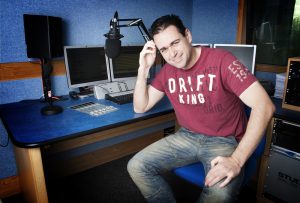
With the Dan Taylor spy novels, myself and narrator Craig Beck opted for an arrangement through ACX (owned by Amazon) which enabled me to get the books out with no up-front costs.
When I worked with Craig, he both produced and narrated the Dan Taylor series of novels, and you can read more about his services here. I had an absolute blast and, if you have a listen to the samples on Audible here, I think you’ll agree that Craig has the perfect voice for Dan Taylor!
The only downside with the ACX arrangement is that we’re limited to distributing the finished product through Audible.
I wanted to reach more audiobook listeners with the Detective Kay Hunter series as more and more opportunities are becoming available to authors to do so.
For this series, I opted to pay outright for the audiobooks to be produced so I could then distribute them through an aggregator that offered a worldwide reach – Findaway Voices. The initial outlay was a lot, but it’s very much been worth it.
Producers Arran and Dave from Audio Factory, together with narrator Alison Campbell are responsible for bringing my Detective Kay Hunter series to life, and they’ve kindly agreed to take you behind the scenes with me.
I asked them to help me explain how the audiobook production process works, and how you can obtain the best results from working with a company like theirs to get your audiobooks out into the world.
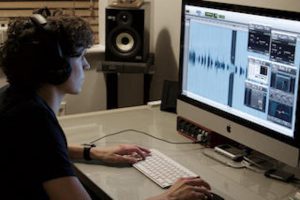
How do I produce an audiobook?
Arran kindly provided his answers to my questions about the production side of things, and here’s what he had to say.
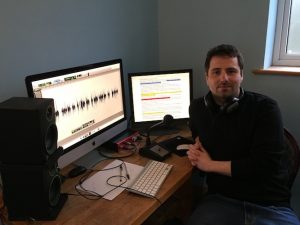
Do you record the manuscript in the order it's written, or do you record out of sequence?
In most cases, we record in order as it's easier for everyone involved to keep track when in the studio, editing, proofing and uploading content. In some circumstances we do change the order and this can be for a number of reasons.
For example, we recently produced a book that featured multiple first person narrative chapters telling the story from different perspectives throughout and the voice artist found it easier to record POV content for each character in one sitting.
How far in advance do you plan for production of audiobooks?
In an ideal world, once a schedule and narrator is in place, I like to have a week to read the book and then another week to carry out the development work. I usually liaise with the author over the likes of characterisation, special considerations for audio and other key creative decisions, and then the narrator and I will record dialogue samples for characters so the publisher or author knows how they will sound in advance.
Arran goes on to explain how narrators are chosen…
‘When someone visits our website, they will see lots of lovely faces and samples to go through, and it's very rare that we have to audition outside that group (though we’re more than happy to do it to find the right voice). Sometimes we’ll receive messages saying that they feel one of our narrators is the voice and if we can agree a schedule then we’re often up and running a lot quicker. I believe that's how it worked out with you choosing Alison to become the voice of Kay Hunter and co!
How many audiobooks are you producing at any one time?
We've only got a small team, but often it's four or five a month.
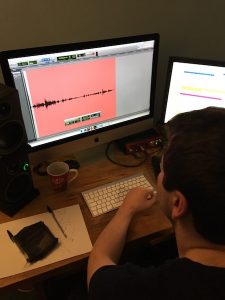
What's one thing you wish authors/publishers did that would make your life easier when producing an audiobook?
Nothing comes to mind – if an author or publisher is looking to do the first audiobook, then our aim is to try and make it as easy an experience as possible and that's why we make sure we prepare well and liaise with them in advance to come up with a plan for the production. You’re all too busy with your next book, so we like to take the hassle out of it!
How do I narrate an audiobook?
Next up, I asked my narrator Alison to give some insights into the process from her point of view.
What sort of preparation do you do before you begin narrating an audiobook?
Every voice artist preps in their own way. The way I prep is meant to streamline my time in the voice booth and make for as an efficient and accurate read as possible. I tend to prep either at home, or in a café, anywhere with a plentiful supply of coffee basically!
I read the book manuscript on my tablet (which feels sacrilegious to me as the daughter of a publisher and editor!) on a programme which allows me to mark up the page like a script.
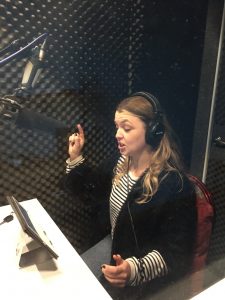
This is what I will be reading from in the booth. As I read it through I highlight character dialogue in various hues of the rainbow, note down tone of speech and any words that I might need a prompt on pronunciation. Separately I note down chapter summaries in a notebook, who is in each chapter, how long they are, a summary of what happens, so that in the voice booth I can be as informed as possible as I go along.
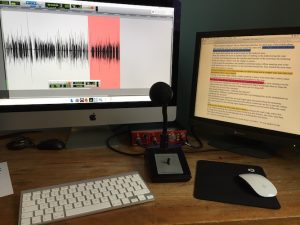
Then comes character finding! Going back through the manuscript I play with character voices, recording samples onto a Dictaphone and playing it back until I’m happy with how it sounds. Then I’ll send off character samples for Arran to send to the author for approval. Author interpretations of character are taken on board at the start of this process but as an actor it’s nice to have space to experiment with my interpretation a bit, as I would with a play.
Big, emotional bits are practiced and then it’s time to get into the studio. That is the end of the coffee enjoyment and time to stay very hydrated, prep for recording needs lots of water, some daft looking/sounding vocal warm ups and an aversion to sugar. Cakes are dangled as motivation for the end of a book!
As a narrator, what is one thing you wish authors/publishers did that would make your life easier when narrating a manuscript?
That’s a hard question! I suppose from an author I’m hoping there aren’t too many characters. As you prep you have to find a unique voice for every single one, even if they only pop up for one line of dialogue. When the count starts heading skywards of seventy or so it starts to get a little more tricky! I’ve done books in the past that have over a hundred, all though it does become quite fun to find new ways to use your voice and get some new or favourite accents in there!
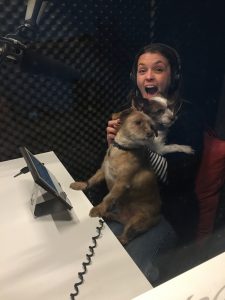
I’m surprised at the voices that come out sometimes, and we have some recurring favourites at Audio Factory when doing books in a series. One of my faves in Kay Hunter is Sharp, I like doing his direct, military bark.
Thanks, Arran and Ali!
I hope you found those insights useful – as you can see, it really is a team effort to get an audiobook ready to publish.
So, after the recording process, what happens next?
How do I upload my audiobook?
Once Arran and Dave from Audio Factory have put all the completed audiobook files into a file share website for me, I download these onto my computer and then upload them to my distribution platform. Each file contains one book chapter, plus I’m given a retail sample that is used by stores such as Audible, iTunes and the like for potential customers to listen to on their sites.
I’ve been working with Findaway Voices since July last year for audiobook distribution, and it’s been incredibly easy to work with them.
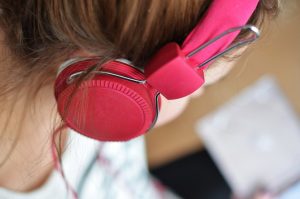
I log into my account, fill in the details for the new audiobook (title, author name, narrator’s name, book description, ISBN number, etc) and then begin to upload each file. If you do accidentally upload a chapter in the wrong order, the Findaway Voices dashboard makes it really easy to drag and drop everything into the right order – and it’s always worth taking the time to check this before you hit the “publish” button!
It takes about 2-3 weeks from hitting that “publish” button to see the audiobook appearing on the retailers’ websites, but you have to remember that audio files are a very different beast to eBook files and it can get quite complicated behind the scenes when sharing this sort of data.
Thankfully, Findaway Voices takes care of all of that for me so I don’t have to worry about it!
How do I distribute an audiobook?
With the ACX interface that I’ve used for the Dan Taylor spy novels, the audiobooks are distributed to Audible by ACX direct, and that’s the only store the books are available in.
With the Detective Kay Hunter crime thriller series, I’ve gained a broader worldwide reach thanks to Findaway Voices. They send out the audiofiles to library wholesalers and retail clients, many of whom run subscription services for listeners similar to Audible but without the lock-in complications that ACX causes authors.
What excites me most is that Findaway Voices is continuing to open up new channels for discovery, and so the list of retailers is growing all the time.
How much does it cost to produce an audio book?
That depends on the length of the manuscript, how many narrators you want to use, and other criteria. The best thing to do is contact a few producers to get quotes to give you a better idea, but common practice is to pay an hourly rate that is based upon the finished product. Take a look at the running times of some of your favourite books to get an idea of how many hours it might be.
Final thoughts on how to make an audiobook
Having my two of my series available in audiobook format for readers was always a goal for me – the more readers I can reach in different ways the better, because then I get to spend more time writing the books I love!
Understandably, the costs involved are not for everyone and so that needs to be a decision only you can take. ACX offers an alternative, as do other providers but please, do your research, tread carefully, and seek advice from organisations such as the Alliance of Independent Authors if you have any questions.
I hope this blog post has given you some valuable insights into how you can publish an audiobook, though – and if you're an audiobook listener, I hope this has gone some way to demystify the process for you. Don’t forget you can listen to samples from the Detective Kay Hunter series here.
Do you listen to audiobooks? What do you like about them, and where do you listen? I’d love to know!

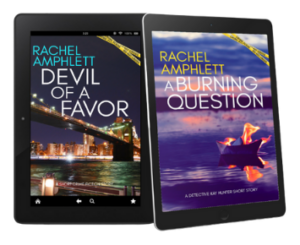

Fascinating article Rachel, and yes, we have found here in library land that audiobooks are the fastest growing category! Hopefully we can get some of your audiobooks through Bolinda Digital or RB Digital for our patrons!
Hi Janine – I’m glad you enjoyed the article, thanks! I’m sure my Kay Hunter audiobooks will be available through RB Digital, as I believe they own Audiobooks.com which sell them here.
The process is a lot more complicated and involved than I imagined. I just thought the voice actor sat down, opened the book a started reading. Thanks for pulling the curtain back and letting us have a peak.
Hi David – isn’t it just? I gained a whole new appreciation for the process when I was working with Craig Beck – he was very patient with me while I was learning! I’ve enjoyed hearing about Arran and Alison’s roles, too and the amount of work that goes into creating a Kay Hunter audiobook.
Thank you for this insightful article. I had only the vaguest idea as to how complicated the production of audiobooks is. Several of the readers of my detective mystery series have asked me to consider doing it in audiobook form, but so far I’ve shied away, largely because of the cost. But you’ve given me new inspiration.
You’re most welcome, Delia – I’m glad it helped to shed some light on the process!
A very informative post – thank you Ms. Amphlett. I’ve let an audio published handle everything for one series of books I’ve written, which has sparked curiosity on my part about the effort involved in trying to self-publish in the audio format. You explained everything so very well! Best of luck with your future efforts.
Thank you, Jeff – glad you found it useful!
Fascinating post as always, Rachel. I’ve yet to dip my toes into the world of audiobooks. I guess I worry that I would drift off whilst listening, get distracted, and end up missing huge chunks. But then I tend to do that with print books anyway, so ? As another person mentioned, I didn’t realise how much work the narrators put into preparing for their readings, all the voices etc. I’m going to have to pop my audiobook cherry one day.
Thank you for recommending this article. Fascinating and informative. I love Alison narration. She brings Kay Hunter to life.
You’re right, Kathy – I can’t imagine anyone else narrating these stories!
Offers to record audio books that I have looked into are deceiving and costly. Has anyone recorded and published their own audiobook?
Hi Marta – I’d suggest you take a look at the Alliance of Independent Authors’ blog as there may be some information via the Alliance from writers who have done this. A link to the Alliance appears on my Contact page.